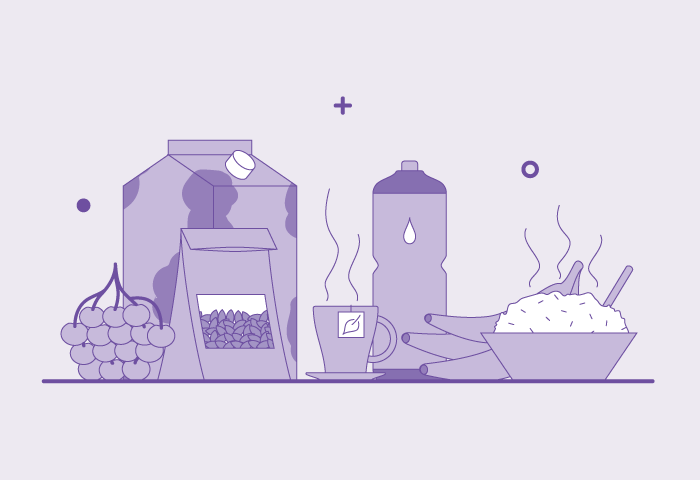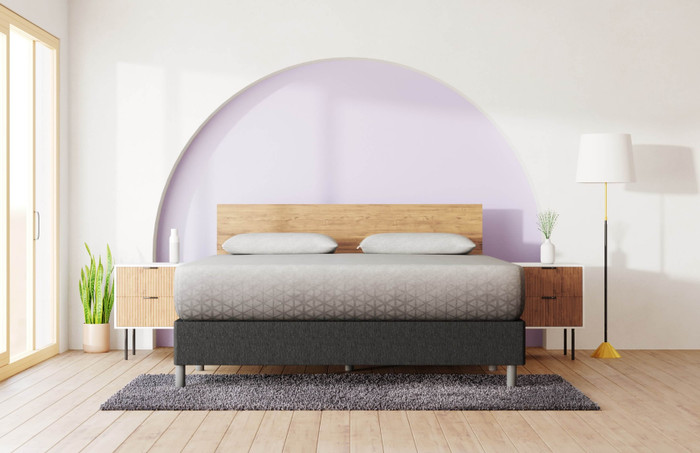Eight Best Foods for Sleep

Your diet affects areas of your life you may not have considered, such as your sleep. Some foods contain vitamins and minerals for better sleep, such as calcium, magnesium, and potassium. Other foods contain the sleep hormone melatonin.
Most of our eight suggested foods make an excellent bedtime snack, perfect for satisfying that after-dinner craving.
Almonds
Almonds are high in melatonin, a hormone that controls our sleep-wake cycle. Our brains produce melatonin when it’s dark, and the production of melatonin stops when it’s light outside. Because of the melatonin present, eating almonds may alleviate symptoms of insomnia.
A 2019 study had researchers giving 10 almonds to more than 400 medical science students for two weeks after the students filled out a questionnaire on sleep disorder symptoms. Almost 78 percent reported symptoms of insomnia before the experiment; after two weeks of eating almonds, the percentage had dropped to 69 percent.
A 2016 study observed that rats who were fed almond extract spent more time asleep, and the study concluded that almond extract has sedative effects that may relieve insomnia.
Milk
Many people turn to a cup of warm milk on a sleepless night, and it might be for deeper reasons than the soothing warmth.
Milk is a source of calcium, a vitamin that may help us sleep better. A 2013 study noted that lower levels of calcium were associated with difficulty falling asleep and a decreased likelihood of getting a restorative night of sleep.
If you like a little dollop of sweetness, consider adding honey to your milk. A 2018 study gave patients in coronary care—a group prone to developing sleep disorders—milk with honey twice daily for three days. Patients answered a questionnaire on their sleep quality before and after the experiment, and those who drank milk with honey later reported better sleep scores.
There’s also the placebo effect behind drinking a cup of warm milk. If you believe that heating and drinking a cup of milk calms you, then it can help you fall asleep.
If you can’t drink milk, a similar substitute can still comfort you enough to fall asleep, such as plant-based milk like almond or coconut.
Herbal Tea
A cup of herbal tea can produce similar effects.
A 2018 study observed the effects of herbal tea on subjects suffering from prolonged fatigue. Participants drank the tea twice daily for four weeks. The tea group reported lower levels of fatigue than the control group and reported fewer symptoms of depression four weeks later. The tea group also reported better sleep quality at the four-week and eight-week check-ups.
Chamomile tea is often recommended and with reason. A 2017 study gave 60 elderly patients a chamomile extract capsule or a placebo, and the chamomile extract group’s sleep quality significantly improved.
And a 2016 study observed the effects of chamomile tea on the sleep quality of women who just had a baby, a group known for suffering from reduced sleep quality. Participants drank chamomile tea for two weeks, and showed fewer signs of sleep inefficiency and fewer symptoms of depression, although only in the short-term.
If you’re drinking tea close to bedtime, just check that it’s low caffeine or caffeine-free. For example, while many find green tea soothing, 8 ounces of green tea contains 28 milligrams of caffeine.
Bananas
Bright yellow bananas are high in several vitamins and minerals—potassium, magnesium, vitamin C, vitamin B6, and plenty of fiber.
Magnesium is one of the key minerals for a better night’s sleep. Magnesium may reduce mild anxiety; however, a 2017 review says more research is needed for a more conclusive answer to this theory.
The potassium in a banana, along with the magnesium, can prevent muscle cramps. And potassium also lowers blood pressure, which is important since high blood pressure is tied to difficulties falling asleep.
If you have restless legs syndrome, a banana might alleviate your symptoms. Restless legs syndrome is often tied to a magnesium deficiency, although as of a 2019 review, the effectiveness of treating restless legs syndrome with ingested magnesium remains in question.
A banana has around 3 grams of fiber (about 10 percent of your recommended daily intake). A 2016 study found low-fiber, high-sugar diets were tied to less restorative sleep, with the sleeper often waking in the night. Higher fiber diets were associated with more time spent in slow-wave sleep, which is hypothesized to help with your brain’s recovery.
Cherries
Cherries might be one of the most melatonin-rich food sources—a handful of cherries can contain more melatonin than the amount you have circulating through your blood.
If cherries are out of season or if you prefer to drink your nutrients, try cherry juice. A 2012 study hypothesized that cherry juice concentrate could increase melatonin levels enough to improve sleep. Twenty subjects drank either a placebo or cherry juice for a week and their urinary melatonin levels were measured.
The melatonin levels were significantly higher in the cherry juice group, and the cherry juice group spent more time asleep and reported more effective sleep.
Water
Water isn’t a food, but staying hydrated can affect your sleep quality. When you go to bed dehydrated, you’re more likely to snore because the mucus in your nose and the back of your mouth gets thicker and stickier if you haven’t consumed enough water. An occasional night of snoring might not reduce your sleep quality, but it can make your partner annoyed with you in the morning.
A 2013 study also found that drinking more plain water was associated with more restorative sleep and less daytime sleepiness.
How much water is enough? The National Academies of Sciences, Engineering, and Medicine recommend 125 ounces of water for men and 91 ounces for women daily—or 3.7 liters for men and 2.7 liters for women. How much you need to drink can depend on your local weather, how physically active you are, and if you’re well or recovering from an illness.
So, should you drink a glass of water before bed? If your throat and mouth feel dry enough to distract you from sleep, yes. However, try to stay hydrated well enough during the day, so you don’t drink water too close to bedtime and risk a midnight bathroom run.
Rice
Having a bowl of rice for dinner might lessen your sleep difficulties. A 2007 study concluded that jasmine rice helped participants sleep better. Participants ate jasmine rice or Mahatma rice four hours before bedtime, and those who ate the jasmine rice fell asleep faster. The study also found that eating jasmine rice four hours before bedtime was more effective than consuming it an hour before bedtime.
However, a 2019 study contradicts this—its results found that white rice helped subjects fall asleep better than jasmine rice.
Combine your rice with zinc-rich meat. A 2017 study observed that participants who ate zinc-rich food fell asleep faster and had a better night’s rest than the placebo group.
And don’t over spice your rice dish, as you may develop heartburn or indigestion as you try to fall asleep.
Walnuts
Walnuts are another source of melatonin. Walnuts also contain tryptophan, a sleep-inducing amino acid.
How to Make the Most of Foods for Sleep
There are many nutrients found in food that can assist with falling and staying asleep.
“While it’s helpful to know which foods to eat, you should also consider the timing and the amount of food,” says Brittany Ford, Registered Holistic Nutritionist. “When we eat within two hours of going to bed, it can disrupt our circadian rhythm, making us wake up multiple times throughout the night as our blood sugar peaks and drops. If you are going to eat after dinner but before bed, make sure it is a couple of hours away from when you turn your lights off,” she adds.
Be aware of how much you’re eating as well. Too much food can disrupt your sleep cycle and also cause havoc on your gut health. If we eat too much and try to go to sleep after, it can take longer to digest the food causing it to ferment and cause other digestive concerns. Keep any after-dinner snacks to small portions to support your gut health.
Frequently Asked Questions
What foods are high in melatonin?
You can find melatonin in fruits, vegetables, various grains, nuts, and seeds. Tart cherries, cherry juice, and walnuts are particularly excellent sources of melatonin.
Do bananas help you sleep?
Bananas are an excellent nighttime snack. The magnesium and potassium relax your muscles, which prevents cramps; magnesium can also reduce mild anxiety, which can prevent the onset of sleep. Sufferers of restless legs syndrome often report that increasing their magnesium intake alleviated symptoms.
What foods cause insomnia?
Anything with caffeine is a must-avoid—so stay away from coffee, tea, soda, chocolate. We don’t mean only chocolate bars, but chocolate-flavored products as well. So if your choice of bedtime snack is a bowl of cereal, go for a high-fiber variety rather than a chocolatey cereal.
You might think it’s safe to drink a decaf coffee close to bedtime, but “decaf coffee” is a misnomer, as the coffee still has trace amounts of caffeine—often 8.6 to 13.9 milligrams. It’s still far less caffeine than the average cup of coffee, which contains about 85 milligrams.
In more general terms, you should not eat fried, greasy, spicy, or fatty foods too close to bedtime. These foods are sometimes harder to digest and often cause heartburn.
Did We Help?
Next time you’re craving a bedtime snack, think about our suggestions for foods that will help you fall asleep and improve your sleep quality. Eating a banana or a handful of almonds, walnuts, or cherries close to bedtime might give you a better night’s rest. If you’d rather have something to drink, try cherry juice concentrate, warm milk, herbal tea, or even a glass of ordinary water.
This article is for informational purposes and should not replace advice from your doctor or other medical professional.
Andrew Russell, Wellness Writer 
Andrew Russell is a part-time writer and full-time sleep enthusiast. At Zoma, Andrew lends his sleep expertise and writes many of our “better sleep” guides. Outside of Zoma, Andrew puts his advice to the test, always trying new ways to get deeper, more restorative sleep. We appreciate Andrew because he doesn’t give advice that he doesn’t follow himself, so you can feel confident his solutions for better sleep really do the trick. Andrew's work has been featured on Ladders, Bright Side, and several other publications.
View all posts

